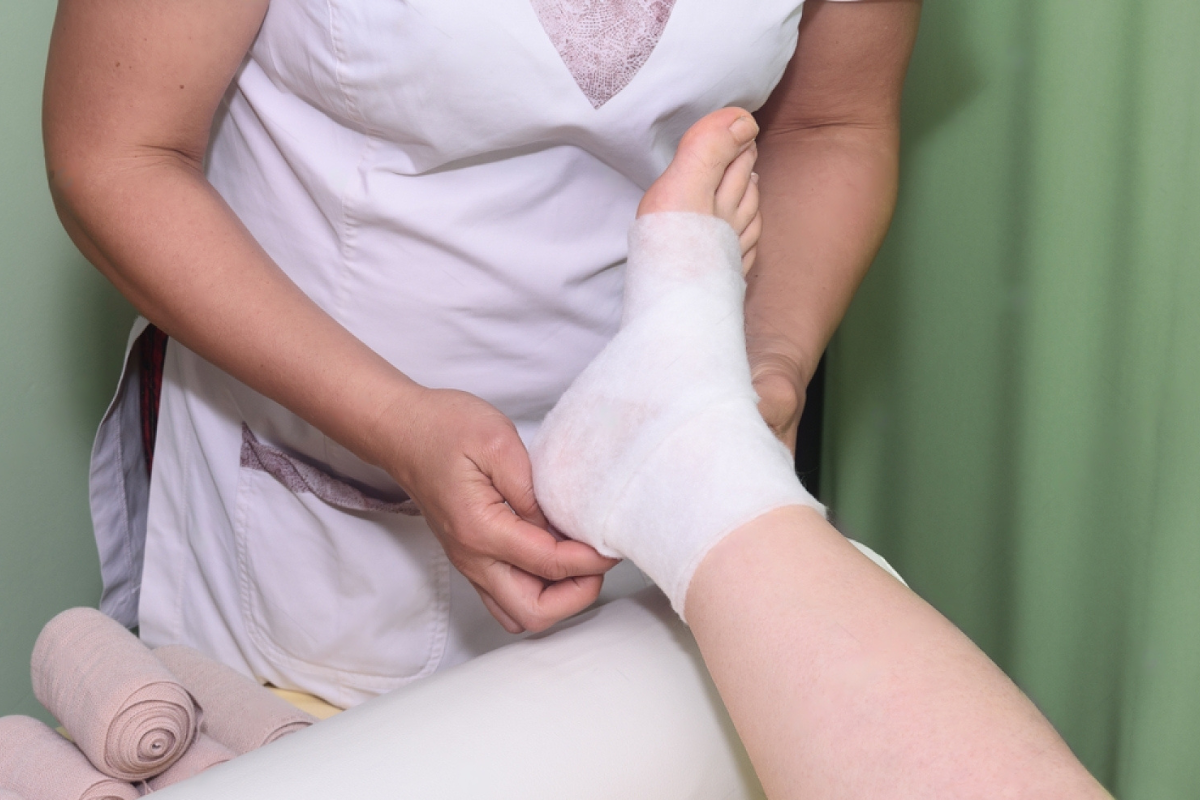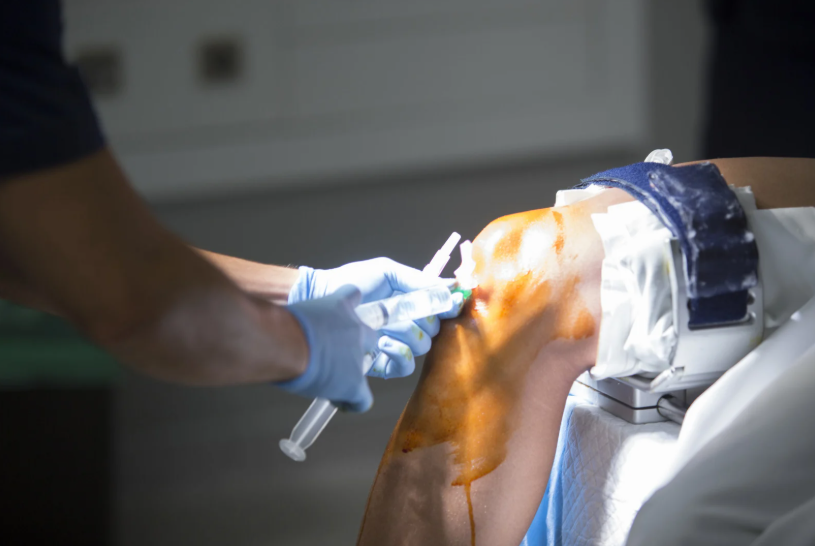Ankle ulcers are painful, open sores that typically develop due to poor circulation, pressure, or infection. For individuals with conditions like diabetes, vascular disease, or poor blood flow, these ulcers can pose serious health risks, leading to infection, limited mobility, and in some cases, even amputations. Orthopedic treatment for ankle ulcers plays a crucial role in addressing these concerns, focusing on alleviating pressure, managing infections, and promoting healing to restore mobility and prevent further complications.
Understanding how orthopedic care can help is vital for anyone suffering from ankle ulcers or those at risk. In this article, we’ll explore the causes of ankle ulcers, how orthopedic care can help, and treatment strategies that can support healing and improve quality of life.
What Are Ankle Ulcers? Causes and Risk Factors
Ankle ulcers are open wounds that develop around the ankle area. They can occur due to prolonged pressure on the skin or insufficient blood circulation. Often, these ulcers form in individuals who have chronic health conditions such as diabetes or vascular disease, both of which hinder proper circulation to the lower extremities.
Causes of ankle ulcers include:
- Poor circulation: Reduced blood flow to the legs and feet can impair wound healing, leading to ulcer formation.
- Pressure: Long periods of pressure on certain areas, often caused by poorly fitting shoes or immobility, can cause skin breakdown.
- Infection: When an ulcer becomes infected, it can worsen, leading to further complications.
People suffering from diabetic foot ulcers are particularly vulnerable to ankle ulcers due to poor circulation and nerve damage. Without proper care, vascular disease can also limit blood flow to the area, making healing even more challenging.
How Orthopedic Care Can Help in Treating Ankle Ulcers
Orthopedic care is essential for managing ankle ulcers as it focuses on not only treating the wound but also addressing the underlying factors that may hinder healing. Orthopedic specialists use various techniques to reduce pressure, manage infections, and promote faster healing.
Key benefits of orthopedic treatment for ankle ulcers include:
- Reducing pressure: Orthopedic specialists often recommend custom footwear or padding to relieve pressure on the affected area, which is essential for healing.
- Improving circulation: By addressing the circulatory issues that may be contributing to ulcer formation, orthopedic care can support better blood flow, encouraging healing.
- Treating infections: Proper wound care and infection management are crucial to prevent complications, such as spreading infections that can delay healing.
Orthopedic specialists are trained to manage the complex nature of these ulcers, helping individuals regain mobility and reduce the risk of recurrence.
Key Components of Orthopedic Treatment for Ankle Ulcers
Orthopedic treatment for ankle ulcers involves multiple components to ensure proper healing and minimize the risk of complications. Key treatment strategies include:
- Pressure Relief: One of the primary goals in treating ankle ulcers is relieving pressure. This is achieved through the use of specialized footwear, orthotic devices, or even surgical options to redistribute weight from the affected area.
- Managing and Treating Infections: Infection management is a crucial aspect of healing ankle ulcers. Orthopedic specialists may recommend antibiotics, antiseptic dressings, or even surgical drainage to prevent and treat infections.
- Wound Healing: Proper wound care techniques, including keeping the ulcer clean and protected, are essential in promoting healing. Advanced dressings and treatment plans tailored to each patient’s specific needs can significantly enhance healing times.
Innovative Treatment Methods in Orthopedic Care for Ankle Ulcers
In recent years, there have been numerous advancements in orthopedic treatment for ankle ulcers. These innovations focus on improving the healing process, enhancing infection control, and offering more customized solutions.
Some of the latest innovations in orthopedic care include:
- Advanced wound care products: Specialized dressings and skin substitutes can accelerate healing by maintaining the proper moisture levels and protecting the ulcer from infection.
- Hyperbaric oxygen therapy (HBOT): This therapy involves breathing pure oxygen in a pressurized environment, which has been shown to speed up the healing of chronic wounds by increasing oxygen supply to the affected area.
- Surgical options: In severe cases where ulcers do not heal with conventional treatments, orthopedic surgeons may recommend surgical intervention to improve circulation, remove necrotic tissue, or even use skin grafts to promote healing.
These innovative treatments can dramatically improve healing outcomes for individuals with ankle ulcers.
Preventing Ankle Ulcers: Orthopedic Solutions to Avoid Recurrence
Prevention is key when it comes to managing ankle ulcers, especially for individuals at higher risk due to diabetes or vascular disease. Orthopedic solutions can help prevent the recurrence of ulcers and improve overall foot and ankle health.
Here are some preventive strategies:
- Proper Footwear: Wearing shoes that fit well and provide adequate support can significantly reduce the risk of pressure-related ulcers.
- Regular Foot Inspections: Regularly checking the feet and ankles for any signs of irritation, redness, or sores can help catch potential ulcers early, preventing them from becoming serious.
- Blood Sugar Management: For those with diabetes, maintaining stable blood sugar levels is crucial to improving circulation and preventing foot ulcers.
- Regular Checkups with an Orthopedic Specialist: Regular visits to an orthopedic specialist for ankle ulcers can help spot any early signs of issues and take preventive measures before they turn into ulcers.
When to See an Orthopedic Specialist for Ankle Ulcers
Recognizing the signs of an ankle ulcer early can make a significant difference in treatment outcomes. Here’s when you should seek orthopedic care for ankle ulcers:
- If you notice open sores or wounds around the ankle area that do not heal.
- If the ulcer becomes red, swollen, or starts to drain pus, indicating possible infection.
- If you have a history of vascular disease, diabetes, or poor circulation and are at higher risk of developing ulcers.
- If the ulcer is causing significant pain, limiting mobility, or interfering with daily activities.
An orthopedic specialist can provide an individualized treatment plan to ensure proper care and healing.
Takeaway
Treating ankle ulcers effectively requires a comprehensive approach. Orthopedic treatment for ankle ulcers focuses on healing the wound, preventing infection, reducing pressure, and supporting circulation to promote recovery. By addressing the root causes of these ulcers, orthopedic care helps patients regain mobility, reduce pain, and avoid serious complications.
If you or someone you know is suffering from ankle ulcers, it’s essential to seek professional care early. Consult an orthopedic specialist to explore the best treatment options tailored to your needs and take the necessary steps toward healing and restoring your mobility.











